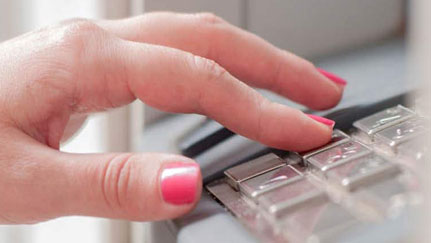
One in five people across the nation have been the victim of identity theft.¹ You can never be too careful when protecting your identity. A little due diligence can go a long way in being your own best identity advocate. Here are some useful tips to help keep your identity safe — no matter where you are:
At home
- Keep most important documents in a safe. Never leave Social Security cards, birth certificates or other important sensitive documents unsecure. Don’t carry your Social Security card in your wallet in case it gets stolen.
- Collect your mail promptly, especially if you do not have a locked mailbox.
- Shred old mail and unneeded documents. This is especially important for credit card and bank statements and bills, phone or utility bills, and preapproved credit card offers.
- Be cautious when asked to release any personal information over the phone.
- Frequently monitor bank and credit card statements for any fraudulent activity. It’s best to catch fraud as early as possible so that action can be taken immediately. This minimizes damage and makes resolution that much easier.
- Check your personal credit report at least once a year. Be sure to review your report at each of the three major credit breaus (TransUnion®, Experian® and Equifax®).
- If you think your child’s Social Security number is at risk, you can check to see if there is a credit report in his or her name. Since most children under age 18 would not have a credit report, the existence of one is a red flag that you should investigate the matter further.²
At work or school
- Store personal items and documents in a secure location, such as a safe or a locked cabinet. This includes wallets, purses and smartphones.
- Don’t make copies of sensitive documents on public machines. Some of these machines can save data, and it’s difficult to know who may have access to them.
- Keep laptops and computer passwords protected. Don’t make it easy for intruders to gain access to personal information.
- Make sure your mobile devices have the lock/security features activated.
Online
- Don’t overshare on social media. Identity thieves often use social networking sites to extract information to answer security questions or piece together any personal information that they’re missing to commit fraud.
- Create strong passwords, and change them often. Passwords should be more than eight characters in length and contain a combination of capital letters, lowercase letters, numbers and at least one symbol. Also make sure each account has its own unique password and doesn’t include personal information.
- Use a personal firewall, and keep it updated. Firewalls block unauthorized access to a computer’s information. Be sure to keep it up to date though, as hackers are constantly creating new ways to infiltrate computers.
- Shop only on trusted websites, and check that they’re secure. Always check the authenticity of a site prior to purchasing anything from it. Also, make sure the site’s URL begins with “https://” (not just “http://”), which denotes that it’s secure.
- Ensure your children follow the same guildelines for their online accounts.
Traveling
- Be cautious using ATMs. Inspect machines carefully for any skimming devices before inserting a card. Also, always shield hands when entering a PIN so that shoulder surfers or any hidden cameras can’t capture input numbers.
- Limit use of public Wi-Fi as much as possible. Many of these networks are unsecure, leaving all the information entered while connected vulnerable. This is why it’s so important to never access banking or credit card accounts or enter passwords when using public Wi-Fi.
- Use one credit card for all purchases, and make sure you sign the back of the card. This will make it easier to monitor accounts during and after travel for any fraudulent activity. Also, be sure to never use a debit card while making purchases. In the event that you do find fraudulent charges, credit cards offer more protection and less risk than debit cards, as funds are not being withdrawn directly from a bank account.
- Lock up valuable documents and items in the hotel. This includes boarding passes, confirmation emails, passports, jewelry and similar items. You can never be too careful, as you don’t know the backgrounds of the hotel staff that has access to your room.
While nothing is 100% foolproof, a proactive identity protection program can give you the peace of mind you need so that daily stresses of life don’t also include identity theft.
Nationwide Private Client’s trusted partner, Generali Global Assistance (GGA), provides proactive identity and credit monitoring that scours the deepest corners of the internet to search for compromised personal information. This give customers the ability to track financial health and easily monitor identity risk levels whenever and wherever they want.
This benefit is included with every Nationwide Private Client homeowners policy. To sign up, simply register on the Nationwide Identity Protection Portal at nationwide.idprotectiononline.com/signup.
If you are Nationwide Private Client homeowners policyholder and need support with an identity theft incident, contact the Nationwide Private Client Solutions Center and select prompt 1 for immediate roadside assistance or to report a claim, then select prompt 4 for identity theft.
If you have any questions, please contact your agent or Nationwide Private Client Risk Solutions professional. For more information on how you can help prevent losses, visit nationwide.com/solutionseries.
We offer this information to assist you in making decisions that can help mitigate your risk. While we cannot address every possible scenario or guarantee these tips will work for you, our goal is to support your efforts to protect yourself and your family.
[1] munichre.com/HSB/data-breach-survey-2018/index.html
[2] consumer.ftc.gov/articles/0040-child-identity-theft